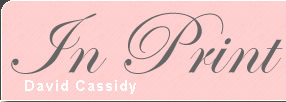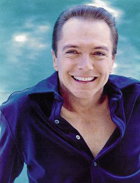
David Cassidy on the Web
Could it be forever?
Cassidy's 'Then and Now' set proves the answer is yes
May 9, 2002
By Mark Wyckoff
Ventura County Star
Same songs. Same studio. Same musicians.
Same magic?
Apparently so. With the British release last October of "Then and Now," David Cassidy discovered just how easy it was to go back and celebrate his musical past. The CD, which featured Cassidy faithfully revisiting such hits as "I Think I Love You" and "Rock Me Baby," shot to No. 5 on the British charts, stayed in the Top 75 for 15 weeks and went platinum.
Last week, Decca Records launched "Then and Now" in America and label execs say the CD should generate the same explosive sales appeal. Cassidy, 52, will sign copies of the 15-track collection Wednesday at Virgin Megastore in Los Angeles (a two-CD set, featuring six bonus tracks, is available at Target stores).
"Expectations are high for the record," said Randy Dry, Decca's vice president of marketing. "This record is not being treated as a catalog title. Rather, it's a way for Cassidy to reconnect with his considerable fan base."
It was Cassidy's reconnection with his "Partridge Family"-era musician pals that actually sparked the project. It happened in 1999, when Cassidy was executive-producing an NBC biopic about his life. Music, of course, had to be a big part of the two-hour movie. But Arista Records wanted too much money to license the original tracks. So Cassidy called up Mike Melvoin, who played piano and did arrangements for most of the Partridge material, and asked him to help.
By the time he met up with Cassidy at Cello Studios in Hollywood -- where the original Partridge hits were cut from 1970 to 1973 (back when the studio was called Western Recorders) -- Melvoin had reassembled the ace studio players who had given the Partridges their distinct sound. For the first time in more than three decades, Hal Blaine (drums), Max Bennett (bass), Dennis Budimir and Louie Shelton (guitar) and Gary Coleman (percussion) were back in Studio 2 to lay down Partridge Family rhythm tracks. On hand to add harmonies were a trio of original background singers: John Bahler, Tom Bahler and Jackie Ward.
The rerecorded tracks -- including the No. 1 1970 hit "I Think I Love You" -- were used in the 2000 movie. Later that year, when Universal Records in England approached Cassidy about releasing a hits package, the singer said he had six tracks already in the can.
"That first day at Cello we had TV crews all over the place," remembered Melvoin, whose jazz trio just released the CD "Oh Baby" on City Light Records. "Everybody wanted to see whether these old guys could recapture the magic.
"It was funny listening to all of us recreate the licks we had used," continued Melvoin, whose piano playing was such a key Partridge element. "We had developed a style of playing that was uniquely Partridge. My job was to play piano like a young Susan Dey -- if Susan Dey had taken piano lessons."
Melvoin had to listen to his old albums in order to recreate the charts he had mapped out all those years ago. But it wasn't hard. As he notes, "it was wonderfully transparent music." That said, he also derived subversive glee in giving Partridge music "nutritional value." "On the string charts, for instance, I would quote Brahms," said Melvoin. "I remember going down to Ventura during the '70s and lecturing at a youth arts program called Artasia. I'd tell the kids about the classical influences in Partridge music. I wanted them to understand that rock didn't have to be ignorant and backward."
Melvoin's favorite musical moment didn't even make the new album. "We cut 'On Broadway' together -- David at the mic and me at the piano. That was gorgeous ... like a jazz ballad."
Cassidy's other "Then and Now" partner was Ted Carfrae, a British producer with a gift for making stellar-sounding acoustic albums. Together they redid some of Cassidy's other hits, including "How Can I Be Sure" and "Cherish," plus a soulful cover of Bill Withers' "Ain't No Sunshine" and a glistening version of Johnny Ray's "Cry."
"I think he did a stunning job on 'Ain't No Sunshine,' " Carfrae said. "It's very earthy and powerful. He actually had the flu when he sang it and didn't like the vocal. And I said, 'I'm sorry, but I'm going to pull rank -- you're not touching it.' "
The best old track on the record, hands down, is the remake of Cassidy's Top 40 hit "Rock Me Baby." It was cut at Jimi Hendrix's Electric Lady Studios in New York. "He did it in one take and I think it's far better than the original. It's a slightly faster track, a little heavier and he sings it the way he sings now. There were some little ad-libs he put in there that he wanted to go back and repair but, again, I said no because it had that magic."
The hardest track to recut was "How Can I Be Sure." "In the early days, he'd sing in a very breathy way," Carfrae said. "But his voice has so much more depth now that he had to learn to do that again. We spent quite a bit of time working on breath control, so he could get enough breath to sing those lines."
Another CD is already in the works. "Now that there is confidence at the retail level, we have support to do something totally new," said Sandra Skiba of Universal Records in Britain. "David has already met with our senior A&R director to talk about direction, producers and writers. We are on our way to a new album next year."
